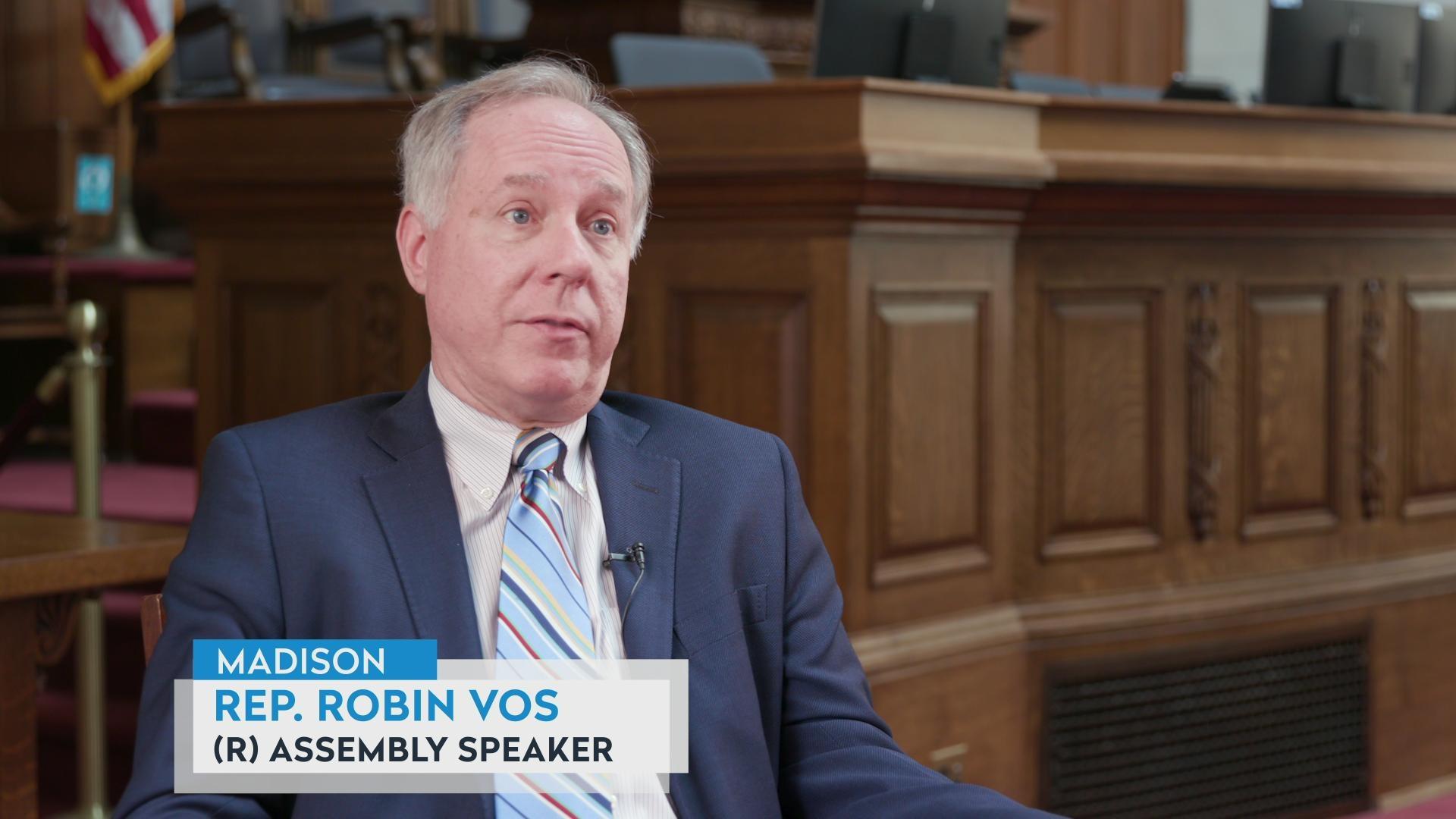Frederica Freyberg:
The new legislative session is set to begin with Republicans in control of the governor’s office in both the Wisconsin assembly and the senate. That’s not an easy position to be in for Wisconsin senate minority leader. This session, a new Democrat will take that post. Jennifer Shilling represents the 32nd senate district near La Crosse. In an extended one-on-one interview I spoke with the minority leader and started by asking whether she feels Governor Scott Walker has a mandate having won three elections in four years.
Jennifer Shilling:
As we head into the new legislative session, I mean, it’s interesting that I don’t think he’s really grown his margin of victory over the last several elections, as you kind of look at that. We still are a very deeply divided state. I mean, that, I think, continues to be sort of that resounding message that I take away from November 4, that we continue to be very polarized, that voters are very much in one camp or the other. But I also get a sense, and coming from western Wisconsin, I feel like I bring coulee region common sense to the legislature, when I'm in the senate, on the finance committee, now in my new role as the minority leader. And where I come from in western Wisconsin, we want people to work together. We expect them to be problem solvers. We expect them to find cooperation and collaboration where we can. Now, I can– You know, I realize that we are in the minority as senate Democrats, but I can count to 14, I can count to 19. But there are some things that I want to help some strained relationships. I really want to help with the tone and the tenor that we have had in the capitol. And, you know, I think the governor is finding it a very sticky wicket to navigate on some of these issues that are kind of being put on his plate when he is flirting with the idea of running for president, if that is in fact what he is thinking about doing.
Frederica Freyberg:
So improving the tone and tenor on some issues, what kinds of issues might those be?
Jennifer Shilling:
Well, I think it’s just sort of the way that we are operating in the senate, if it’s behind-the-scenes with myself and the majority leader and just some quality of life issues for senators and process. But it’s also recognizing that we will agree to disagree, but we don’t have to be so disagreeable about it. We don’t have to take things so personal, and recognizing relationships outside of this building is important in trying to– We have a lot of new faces in the legislature, a lot of new elected officials in the senate. We have seven or eight new members, many of them have come from the assembly. Some are new to this building. And making sure that this is a place that we can discuss ideas, that we in the minority have the right to be heard, we have the right to offer alternatives. We know that the majority will prevail, but we need to make sure that our ideas– And really for Democrats, we have been on the right side of many things that voters have said, yes, we agree with in this state. It’s marriage equality, it's raising the minimum wage, it's expanding and accepting that Medicaid money and expanding BadgerCare. These are things that have been on the referendum or on the ballot, like in November. And the courts have weighed in with marriage equality and we have been fighting for these things in the state, and we have a connection with voters in that area that they’re strongly supportive of our efforts. But yet we have a disconnect with sort of the rest of our message and ideas and growing our numbers as Democrats in the assembly and the senate.
Frederica Freyberg:
Do you get the sense that the majority will embrace this new tone and tenor?
Jennifer Shilling:
Well, when– Three weeks after the election when, you know, we hear about this right to work discussion on the radio that Senator Fitzgerald went off on, I mean, I felt, well, honeymoon over. I mean, it was a short honeymoon. I haven’t even had my permanent name on the door here in the leadership office, and then we have this that we are really trying to educate the public, talk about that this is– Right to work is really a misnomer. It is not what it seems. We need to kind of hit the pause button on this. And as we talk about why it’s important that we are growing our economy in ways that are helping family wages that have been stagnant for too long, right to work, so-called right to work, it continues to depress wages in our state. And we don’t need that at this time. We do not need to continue to lower wages in this state for working families. We need to look at ways that we can grow our economy, pro-growth initiatives, looking at entrepreneurs and small businesses and worker training. But this is wrong, and we are going to talk about how it’s really government intrusion in a private sector contract.
Frederica Freyberg:
So senator majority leader, senate senator, Scott Fitzgerald, wants to fast track this right to work. And yet Governor Walker has said he thinks it’s a distraction right now and even Speaker Robin Vos suggests that you go slow on it. Do you think those things are genuine on their part?
Jennifer Shilling:
Well, it is a distraction. I mean, that’s one of the first things when I said this will be a distraction. It already is, as we are talking about this. I’m trying to, you know, figure out exactly the process of this is a wink and a nod, like I really don’t want this on my desk, but if it happens, it’s here, I have to act on it. Or if this really is seen– I mean, if he's being genuine saying, this is really a distraction, there are other things the we can do. And I think there are things we can do to build our economy. We continue to have anemic job growth numbers. Our surrounding states are growing faster than we are. And so I think it is thoughtful that we pause on this, because this is not what we need in this state. And, you know, it’s one thing if somebody is talking about this as sort of a one-day story as an author of this bill in the past, but suddenly when the majority leader is talking about this, it gains momentum. And we are having discussions with folks about what this truly means, and this is not the right avenue to go down to help grow our economy and try to strengthen it and help working families in this state. It really is a misnomer.
Frederica Freyberg:
Have you determined yet whether or not that is a wink and a nod?
Jennifer Shilling:
I think, as many things in this building, it’s fragile and it’s complicated. So to kind of figure out, you know that– Again, there are a lot of sub plots, because if the governor is flirting with running for president, what does that mean to sort of his vision? We know that it is not something that it benefits Wisconsin families and it is not a vision that is helpful or healthy for Wisconsin workers.
Frederica Freyberg:
Another Republican priority issue now, especially on the heels of the audit is reforming the Government Accountability Board. In your view is that a mistake or is it needed?
Jennifer Shilling:
I think from that audit there are take-aways, that there are always room for improvement, and look at some of the things. Certainly, it was unprecedented at a time in 2011, 2012, a lot of elections were happening at that time that we had the recalls, that there was a lot being asked of the staff at the GAB. They had asked for additional resources. So I think there are some take-away. I want to look at that, talk with our caucus about sort of what is the right direction as far as if there are improvements that need to be made. But we need to make sure that our elections are fair, that that GAB remains impartial. And that it is something that, again, it’s sort of taking our eye off the ball about economic recovery in this state and what are families thinking about, talking about around the dinner table. And I don’t think the GAB is one topic that creeps into their conversations at dinner or over breakfast. I think they’re worried about the affordability of higher education in this state and sending their sons and daughters off to a tech school, a technical college or a university, and then being saddled with debt. They’re worried about, you know, the schools that they're sending their sons and daughters to, those public schools, those rural schools. I represent western Wisconsin, you know, urban, suburban, rural. They’re worried about, you know, transportation and infrastructure in this state. That’s what they care about. I don’t think GAB is something that passes their lips easily.
Frederica Freyberg:
Now, on the state budget, I keep recalling the refrain we're broke from four years ago. Are we broke again and, if so, what does that mean going forward for state programs and the state budget?
Jennifer Shilling:
Well, earlier this year the fiscal bureau came out with kind of that structural deficit of 1.8 that we were looking at. Then it grew with the agency requests to $2.2 billion. So as we look ahead into this next budget, talking about some of those investments that really have been put off on the back burner for too long, under-funding areas in the budget. But yet it’s hard to reconcile that the continued conversation of these tax cuts. Because we are looking at the transportation budget, $680 million deficit. We have seen sort of the response from the transportation secretary’s budget proposal. We’ll see what the governor does on that. But there are a lot of investment areas in this state that people are saying, you know, we have sort of been put on the back burner, we have had to hold tight for a long time, but we are now– We are seeing that because we didn’t put money up front early, it’s costing us more in the long run to sort of deal with some of these issues.
Search Episodes
News Stories from PBS Wisconsin

Donate to sign up. Activate and sign in to Passport. It's that easy to help PBS Wisconsin serve your community through media that educates, inspires, and entertains.
Make your membership gift today
Only for new users: Activate Passport using your code or email address
Already a member?
Look up my account
Need some help? Go to FAQ or visit PBS Passport Help
Need help accessing PBS Wisconsin anywhere?

Online Access | Platform & Device Access | Cable or Satellite Access | Over-The-Air Access
Visit Access Guide
Need help accessing PBS Wisconsin anywhere?

Visit Our
Live TV Access Guide
Online AccessPlatform & Device Access
Cable or Satellite Access
Over-The-Air Access
Visit Access Guide
 Passport
Passport


















Follow Us